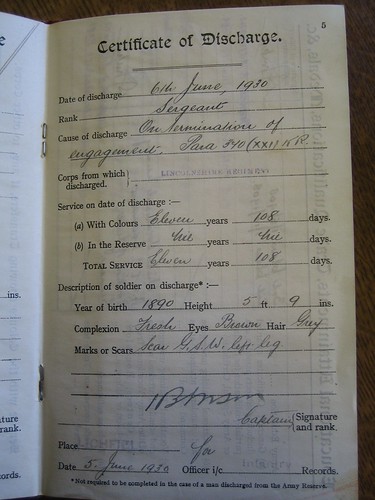Life after the Lincolnshires
 By 1930, Walter had spend 22 years in the army: 16 with the Royal Lincolnshires (1908-1915, 1921-1930) and 6 with the Machine Gun Corps (1915-1921). With the exception of a few months in England during little Cyril's medical care in 1923, Walter hadn't been "home" in 11 years. It was, of course, a different world from the one he'd left in 1919 - and Walter had to get back into a non-military life. Here's how he handled it:
By 1930, Walter had spend 22 years in the army: 16 with the Royal Lincolnshires (1908-1915, 1921-1930) and 6 with the Machine Gun Corps (1915-1921). With the exception of a few months in England during little Cyril's medical care in 1923, Walter hadn't been "home" in 11 years. It was, of course, a different world from the one he'd left in 1919 - and Walter had to get back into a non-military life. Here's how he handled it:I have completed my story up to my final discharge from the army in June 1930, and now, I am going to continue my story of life in the Cold World.
When I arrived in England, the regiment went to Dover and I was sent to Hounslow to the Army Vocational Training Centre. Here you are furnished with references to produce to any prospective employer. I had a good “jumping-off” ground, as May and the two children were settled in a flat in North Sheen near Richmond. I was granted three months’ leave pending discharge from March to June. I hadn’t decided what steps I should adopt in seeking employment.
My brother-in-law Charlie (who I assisted in his window cleaning business in 1919 for four months, which enabled him to get established) called round to see May and I to see how we were faring. He told me there was an advertisement in the Barnes and Mortlake Herald for a school caretaker. £2-5-0 per week at the Mortlake Boys’ and Girls’ Central School, and he advised me to apply for it. He suggested that I go and see Mr. Blake, a well-known jeweler in East Sheen who was also a great friend of Charlie’s family. I did so, and Mr. Blake took me to the Bull Hotel where he asked me to have a drink and then wait for him, as he was going to see someone in the Lounge about my intention to apply for this caretaker’s post. After a while, Mr. Blake came out, and told me to write out an application enclosing my references to the Divisional Officer, and I was to await for a reply.
A few days later, I was informed to attend a Selection interview at the East Sheen Junior School where the school managers were present. There were twelve applicants, and we were interviewed in alphabetical order, so I was last to be seen. Many questions were asked of me, but one question nearly got me “stumped.” Did I have any experience of central heating boiler work? “A little,” I said, “but I would soon overcome that difficulty.” I was selected to be the caretaker, commencing on the 29th April 1930.
The work that had to be done was very exacting. I had two women cleaners who were not very co-operative. They had apparently been employed for several years, but that didn’t deter me to adopt a new system of hours they must perform. I used to go home at night, very tired with sweeping classroom floors, and stoking four boilers, but I gradually got into the way of things. The Headmaster, a Mr. Hill, he was a Captain in the East Surrey Territorial Army. I used my cycle to great extent around the playground. When the Whitsuntide holiday arrived, the boilers were not required, so the work became much easier. Whitsun holidays came along, and the school had to be cleaned throughout. I was gradually getting used to the many tasks that my job entailed.
The days and weeks went by, and I became more confident in my work. I got much amusement out of the children during their play interval, and they got to know me. I was able to arrange for Douglas and Ronnie to attend the school. Douglas in the Boys’ School, and Ron in the Primary School. Doug was able to cycle to and from school, whereas I used to take Ron on the crossbar of my cycle with a cushion to sit on, as he was nearly five years of age then. I was still receiving my army pay while I was working at the school, as it was in my leave period. It was a struggle for us to get used to the shopping and the various commitments that had to be met, but by careful self-denial, we managed quite alright.
As always, Walter rolls with the punches and is able to conform to whatever situation in which he finds himself - from the workhouse children's homes to the training ships to life in (and out of) the military wherever it may take him. Very adaptable and level-headed throughout.

0 Comments:
Post a Comment
Subscribe to Post Comments [Atom]
<< Home